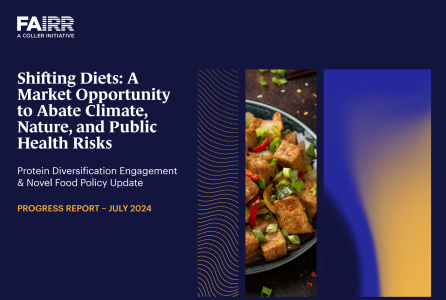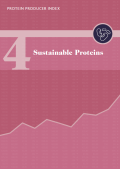Report Overview
Food manufacturers and retailers are increasingly recognising the interconnectedness of protein diversification in achieving climate, nature, and health goals. However, companies are relying mainly on on-farm climate solutions and overlook scientific recommendations to shift diets towards plant-based proteins as a key lever for the agri-food sector's net-zero roadmap. While companies acknowledge the market opportunity of protein diversification, most players are not tapping into its climate mitigation potential and have yet to integrate their growing plant-based product portfolio into their climate roadmaps to support the uptake of sustainable healthy diets.
This report discusses learnings and insights from the first year (Phase 1, 2023/24) of FAIRR’s Protein Diversification engagement, a collaborative investor engagement with 20 leading food retailers and manufacturers. It also identifies lead industry practice examples and provides an update on the current market and regulatory environment for novel protein sources.
The findings of this report can help investors:
Assess the material climate, nature and public health risks of animal protein exposure, and identify how protein diversification can mitigate these risks and act as a financial opportunity.
Understand how companies are mitigating these risks and seizing new market opportunities by diversifying their protein portfolios through in-depth company analysis.
Assess lead practice examples of protein diversification strategies that are aligned across business functions.
Highlight company trends to understand common and contrasting themes and approaches.
Provide an update on the policy and regulation landscape surrounding alternative protein sources.
Interview with an alternative protein company that illustrates the challenges and future views of the novel dairy sector.
Report Highlights
In its analysis FAIRR has found the following key findings:
Despite 95% of companies dedicate resources to expand their plant-based protein portfolios, 75% of companies overlook protein diversification as a tool to decarbonise.
Whilst 100% of companies have climate commitments and 70% have board-level climate expertise to support meeting them, only 75% of companies have commitments on nutrition and/or health and only 25% have board expertise on the topic.
Whilst 80% of companies have reported evidence of supporting their animal protein supply chains to decarbonise, most of these support measures are not grounded in a formal commitment to a Just Transition and do not consider the impact of a diet shift on supply chains.
Market challenges driven by the cost-of-living crisis and the ultra-processed narrative have not deterred companies from expanding plant-based ranges. However, there has been a shift to more plant-based whole foods over meat and dairy alternatives in some markets.
Attracting the mainstream consumer and the flexitarian is a priority for companies. To achieve this, companies are leveraging a variety of marketing strategies such as loyalty card discounts, recipe inspirations, in-store product placements, and labelling techniques.







